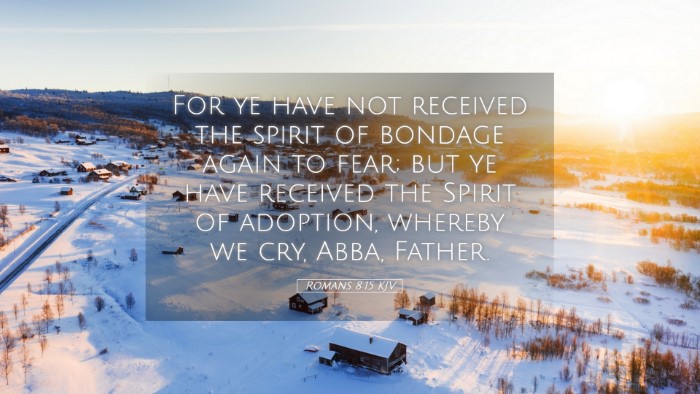Commentary on Romans 8:15
Romans 8:15 states, "For you did not receive the spirit of bondage again to fear; but you have received the Spirit of adoption, whereby we cry, Abba, Father." This verse is rich with theological significance and serves to uplift and encourage believers regarding their identity in Christ and their relationship to God.
Understanding the Context
In order to grasp the depth of Romans 8:15, it is essential to consider its context within the broader narrative of the Epistle to the Romans. The Apostle Paul is dealing with the transformative power of salvation and the role of the Holy Spirit in the life of a believer. This chapter particularly addresses the victory over sin and the life in the Spirit, contrasting the life that is led by the flesh with the life led by the Spirit of God.
The Spirit of Bondage vs. The Spirit of Adoption
Paul begins this verse by reminding the Roman believers that they have not received a spirit of bondage. This can be understood in several layers:
-
Fear and Slavery: Matthew Henry emphasizes that prior to salvation, individuals are under the bondage of sin, which leads to fear—fear of judgment, condemnation, and the wrath of God. This spirit of bondage is akin to servitude, where one is not free but held captive by the powers of sin and death.
-
The New Life: In contrast, believers receive the "Spirit of adoption." Albert Barnes asserts that this is a profound transition where individuals are no longer mere servants but have been elevated to the status of children of God. This new identity embodies a relationship characterized by love, acceptance, and companionship with the Father.
The Concept of Adoption
The term "adoption" deserves a significant focus. Adam Clarke notes that adoption in Roman law allowed a person to become part of another family with all the rights and privileges of a natural child. This indicates a profound transformation in the believer's status.
-
Intimacy with God: The use of "Abba, Father" highlights the intimate relationship believers have with God. It signifies a move from fear to familiarity, allowing believers to approach God with the same closeness a child has with a parent.
-
Legal Rights: Those adopted by God have legal standing before Him, akin to that of true children. They are heirs to the promises, which Paul elaborates on later in Romans 8, speaking of being co-heirs with Christ.
Freedom from Fear
The key phrase "did not receive the spirit of bondage again to fear" reinforces a crucial aspect of Christian life: the absence of fear in relation to God. Believers are invited to shed any lingering fears stemming from their past or the consequences of sin.
-
Security in Christ: This security is not a license to sin but rather a foundation for living righteously. The freedom from fear invites believers into a bold, dynamic faith that allows them to interact with God in confidence, knowing they are accepted and loved.
-
The Role of the Holy Spirit: Central to this assurance is the active role of the Holy Spirit in believers' lives. The Spirit attests to their new identity, witnessing with their spirit that they are indeed children of God.
Theological Implications
The implications of Romans 8:15 stretch beyond personal assurance to encompass broader theological themes:
-
Justification and Sanctification: Romans is a letter heavily focused on both justification by faith and the process of sanctification. The "Spirit of adoption" also correlates with the justification of believers through faith and their continuous sanctification as they walk in the Spirit.
-
The Trinitarian Work: This verse also reflects the Trinitarian work within the believer's life - God the Father adopts, God the Son redeems, and God the Spirit confirms the relationship. This underscores the unity of divine action in the life of the believer.
Encouragement for Believers
For pastors, students, theologians, and Bible scholars, Romans 8:15 provides rich material for study and application. It offers profound encouragement to believers to embrace their identity in Christ and to live free from the fears and chains of past sins.
-
Transformational Promise: The transformation from bondage to adoption is a promise that undergirds the Christian faith. Believers are called to live out this new identity, embracing their status as heirs of God with confidence.
-
Practical Application: Encourage congregants to reflect on their identity in Christ and the security that comes with being an adopted child of God. This identity can empower them to confront fears and obstacles in their spiritual journey.
Conclusion
In conclusion, Romans 8:15 encapsulates key elements of Christian doctrine regarding salvation, identity, and relationship with God. It challenges believers to reject any spirit of fear and embrace the profound truth of their adoption as children of God. As they live in the light of this identity, they experience the richness of a relationship that is both intimate and transformative.


